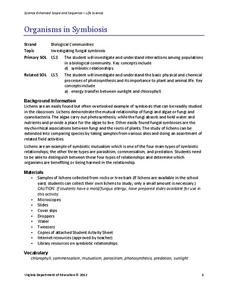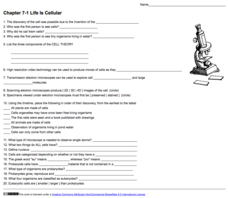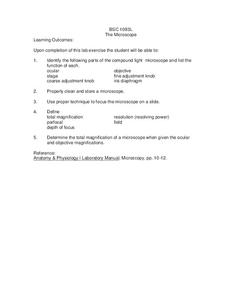Curated OER
Algae Part One: An Introduction
Students have the opportunity to view two types of algae under 400x magnification with a compound microscope. They make observations and record their observations through drawings and words. In addition, they identify different qualities...
Curated OER
Light Microscopes
Seventh graders study the parts of a light microscope, and its proper use. They identify each part and explain why it is important to know how to use this tool. They practice observing newsprint on a wet mount slide.
Curated OER
Using the Microscope
High schoolers demonstrate their ability to properly make observations using a compound microscope. They prepare an onion skin slide and focus on it in both low and high power. Then they measure the diameter of one of the cells.
Science Matters
Matter Cycles — Sum It Up
Scholars become part of the cycle of matter with a reader's theater that showcases producers, consumers, decomposers, and the sun. A diagram and discussion concludes the learning experience and enhances comprehension.
Odell Education
Plant and Animal Cells
Incorporate multiple facets of the cell into your next high school lab! Through an introduction to cell organelles, class members observe each cell type and draw visuals to further demonstrate understanding of cellular processes in both...
Curated OER
Discovering Cells
Students will learn about the pioneers who discovered the cell and its parts. They will be able to relate advances in microscope technology to the discoveries. Students diagram a time line and answer questions at the end to check for...
Science 4 Inquiry
Plant Structures Lab Stations
In China, hibiscus is known as the shoe flower because it is used to polish shoes, while in Hawaii, it is honored as the state flower. Young scientists learn about the structure and function of flowers. They dissect hibiscus flowers,...
Curated OER
Observation and Discovery
Students explore the basic skills guiding sound scientific invvestigation and methodology. They are introduced to a powerful scientific tool-the microscope. Students review the parts of the microscope. They discuss the inventor of the...
Curated OER
Seeing Cells
Students discuss what comes to mind when they hear the term cell and discuss what a cell is in biological terms. They look at pictures of cells and color a picture of a cell diagram, writing the job of each part as they go. After the...
Institute of Electrical and Electronics Engineers
Be a Scanning Probe Microscope
Extensive reading is done in order to learn about scanning probe microscopy and nanoscale. Afterward, individuals use a pencil to probe an unidentified object that is inside of a box so that they cannot see it. Using only what they could...
Virginia Department of Education
Organisms in Symbiosis
Searching for an activity that allows emerging biologists to explore symbiosis up close and personal? Pupils collect samples and view lichens through a microscope and conclude with a discussion about the relationship they have with other...
Curated OER
Exploring Magnification and the Micro-world
Students examine what magnification is and does. In this microscope and magnification instructional activity, students listen to a reading of Greg's Microscope by Millicent E. Selson which explains what a microscope does. They talk about...
Curated OER
Quiz Questions - Cells
In this cells instructional activity, students read and choose the multiple choice answers to 20 questions involving cells, microscopes, and the life process of Growth.
Curated OER
Seed Detectives
Young scholars examine seed coats. In this biology lesson, students look at pictures of magnified seed coats, then use hand-help magnifiers or microscopes to look at seed coats on their own.
Curated OER
Examining a Microchip
In this computer technology lesson students investigate silicon microchips. Students explore microchip technology using a microscope. Lesson contains hands on investigations.
Biology Corner
Life is Cellular
For this cells activity, students answer questions about the first person to see a cell as well as the evolution of microscopes. They define the parts of a cell and tell the differences between Prokaryotes and Eukaryotes. There are 20...
Curated OER
Pond Life Identification Kit
Students explore ecology and biodiversty. They use the wet-mount procedure to make several slides to view using the microscope and draw what they see.
Curated OER
Waterworks
Students investigate the water quality of a river. In this water quality lesson plan, students use microscopes, probing devices, and global positioning systems to determine water quality and create presentations on it.
Curated OER
Stomata: Microscopic Openings that Let Plants Breathe
Students participate in a lab experiment to observe and measure the opening and closing of stomata. They focus on photoperiod, locate and identify stomata on a leaf and explain the role of stomata in the daily functioning of a plant.
Curated OER
Introduction To Insect & Spider Body Parts
Students inspect several different specimens of insects and spiders to determine characteristics that are similar and different between the two groups. They identify the basic body structure of spiders and insects and then predict where...
Curated OER
Plant Structure and Function
Students examine the structure of Velcro and its function then relate it to seeds and seed stock. In this experimental instructional activity students test seed activity and what its function is for the plant, examine seeds under a...
Curated OER
The Microscope
In this microscope instructional activity students explore the compound light microscope. Students discover techniques concerning cleaning, storage and proper use of the microscope. Students discover the working parts of the compound...
Curated OER
Micros-organisms
Sixth graders examine mold with a microscope. In this micro-organisms lesson, 6th graders use teacher-prepared mold samples to prepare a wet-mount slide and examine the mold under a microscope then draw and label what they see.
Curated OER
Looking at French Decorative Arts: The Science of Good Design
Students examine the style of an 18th-century compound microscope and its case. In this scientific design lesson plan, students look at Jacques Caffieri's, "Compound Microscope and Case" before comparing the design to a modern...

























